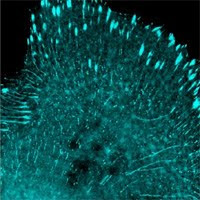Allele’s New Products of the Week, Oct 19-26, 2009: DNA oligonucleotide synthesis reagents dA, dT, dC, dG controlled pore glass (CPG) beads for oligo synthesis. With previously launched CPG beads and phosphoramidites for modified oligos, this product line now provides the most essential materials for oligo synthesis by university core facilities, company internal oligo production groups, or commercial oligo providers at significantly reduced prices.
Allele’s Weekly Promotion Oct 19-26, 2009: In accordance with the launch of the above new products, all 3’ amino, thiol, Dabcyl, FAM, biotin modified oligos of 50 to 200 nmol scale are offered at unprecedented $10/modification.
Question1:
What do you have available that can be added to the 3’ end of a primer/probe to stop PCR amplification?
There are a few commonly used modifications on the 3′ of an oligo to block polymerase extension, e.g. C3 spacer, amino-modified C6, inverted dT, phosphate. Although no 3′ blocking modifications are 100% effective, the amino-modified C6 offers the best result, leaving1% or less unblocked; phosphate is not as effective of a block, with up to 2% unblocked. We recommend 3’ amino group also because it is less expensive compared to other 3’ modifications if ordered from Allele Biotech.
Question2:
Can you provide 5’ digoxigenin as a standard modification on your oligos?
5’ Dig is typically added by conjugating the digoxigenin group to a 5’ amino added during oligo synthesis. 5’ amino modification can be ordered from almost all oligo suppliers including Allele. You may need to add digoxigenin using a commercial kit by yourself. If you are interested in having Allele Oligo Service perform the chemical linking, email oligo@allelebiotech.com.
Question3:
Is Dabsyl a misspelling of Dabcyl?
DABCYL acid is the abbreviation of 4-(dimethylaminoazo)benzene-4-carboxylic acid. Sometimes DABSYL (4-dimethylaminoazobenzene-4”-sulfonyl chloride) is mistaken for ‘DABCYL’. They do share similar properties as fluorescence quenching agents, with minor difference in maximum absorbance, but can in general be used interchangeably in pair with fluorescent dyes such as FAM. Allele uses Dabcyl as its standard 3’ modification and, by using its own oligo synthesis reagents for adding this group, offers a price less than half of most other oligo manufacturers (check back for pricing updates next week for even lower prices). DABCYL is one of the most popular acceptors for developing FRET-based nucleic acid probes and protease substrates.
Thursday, October 22, 2009
Q&A About Choosing Modified Oligos
Labels:
3’ amino,
CPG beads,
dA,
Dabcyl,
dC,
dG,
dT,
FAM,
modified oliogs,
oligonucleotide synthesis reagents,
phosphoramidite,
Promotion Oct 19/26/09,
thiol
Subscribe to:
Post Comments (Atom)




No comments:
Post a Comment